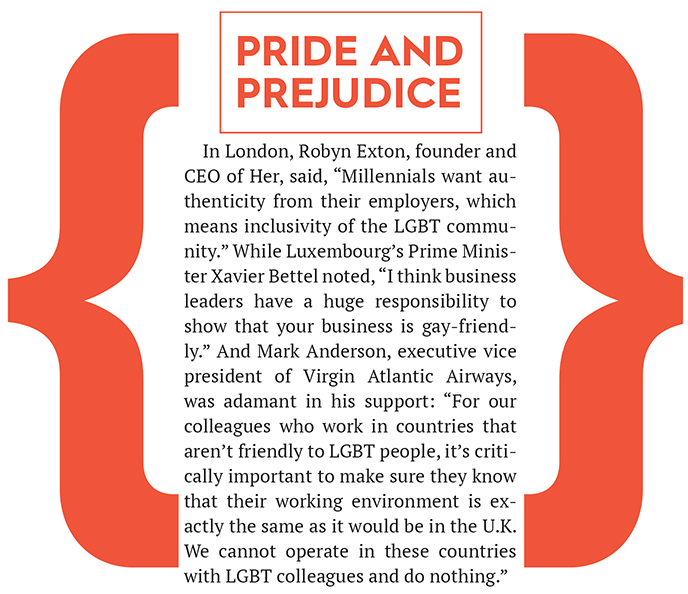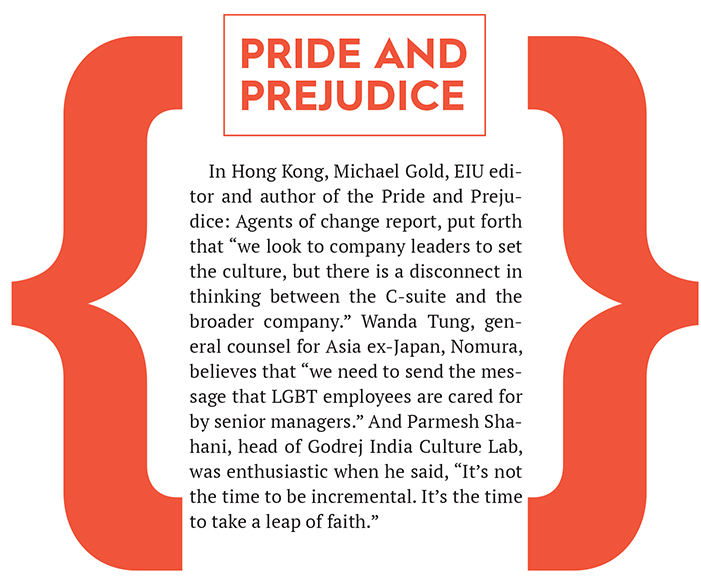
In 2016, the business sector made some important strides in the fight against discrimination against LGBT people around the world. Eighty-seven percent of Fortune 500 companies now have non-discrimination policies based on sexual orientation, and for the first time ever, the issue made it to the agenda of the World Economic Forum in Davos.
But still, even with the progress made, there are still policymakers and industry leaders all over the world having to tackle the thorny questions pertinent to their particular regions including; How will the rise of illiberal populism in the west impact the outlook for LGBT rights? How are new generations changing the meaning of diversity and forcing companies to rethink their inclusion policies? What can advocates for LGBT inclusion learn from other groups that have been marginalised? What can we learn from case studies of businesses operating in parts of the world where cultures or laws are hostile toward LGBT people?
On March 23, 2017, those answers came to fruition in the The Economist Intelligence Unit (EIU) that unveiled groundbreaking research around the status of LGBT people in the business world. The report, entitled Pride and Prejudice: Agents of change, based on a global survey of over 1,000 professionals has been released in conjunction with The Economist Events’ second annual Pride & Prejudice Summit, a global 24-hour event held on the same day in Hong Kong, London and New York.
Key speakers at the event included a variety of statesmen, including Chilean President Michelle Bachelet Jeria, business leaders such as Mike Pedersen, president and CEO of TD Bank, and public figures like actress and activist Amber Heard.
The Agents of change report, aligned to many of the topics being debated at today’s summit, was based on a global survey of over 1,000 professionals. Among its findings:
 When asked to identify which employee cohort is most likely to guide company thinking on LGBT diversity and inclusion, respondents chose young employees and the C-suite as the top two groups, with 27 percent and 24 percent, respectively.
When asked to identify which employee cohort is most likely to guide company thinking on LGBT diversity and inclusion, respondents chose young employees and the C-suite as the top two groups, with 27 percent and 24 percent, respectively.
Yet only 16 percent chose the C-suite as the group most likely to support LGBT workplace diversity and inclusion, ranking this group a distant fourth place.
- 40 percent of junior staff said they don’t know who guides company thinking on LGBT diversity and inclusion, while only 16 percent of C-suite respondents said they don’t know.
- 33 percent of C-suite members—versus only 13 percent of junior workers—said broader company leadership is most eager to support LGBT workplace diversity and inclusion.
- 37 percent of millennials believe there is a potential ROI/business opportunity in enacting LGBT-friendly workplace policies and practices—eight points higher than average.
- “It’s such an important time for the issue of LGBT diversity in the workplace, and we want to look at the survey results with an eye toward continuing the positive momentum that’s been achieved in the past few years,” says Michael Gold, EIU editor and author of the report. “We believe it’s crucial to continue the conversation about what progress has been made, what progress can still be made—and how we can work together to help make it happen.”
In addition to young employees, women are also crucial in raising the status of LGBT people in the workplace, as they show consistently higher support for LGBT causes than men. The report also found that:
- 69 percent of women say corporate silence on LGBT inclusion is no longer acceptable, versus 54 percent of men.
- 75 percent of women believe companies must take a stand against government-supported policies that discriminate based on sexual orientation or gender identity, versus 63 percent of men.
- Women are 10 points more likely than men to say they want to work for a company that is an advocate for LGBT diversity and inclusion (64 percent versus 54 percent).
The Economist Intelligence Unit’s analysis of the survey findings has led to the creation of a suggested framework for achieving positive change for LGBT employees through three workplace groups: C-suite leaders, young people and women.
 About The Economist Intelligence Unit
About The Economist Intelligence Unit
The Economist Intelligence Unit is the world leader in global business intelligence. It is the business-to-business arm of The Economist Group, which publishes The Economist newspaper. The Economist Intelligence Unit helps executives make better decisions by providing timely, reliable and impartial analysis on worldwide market trends and business strategies. More information can be found at www.eiu.com.
Look Who’s Talking
Chaired by The Economist editors, Pride and Prejudice 2017 linked conversations between three locations via live video sessions
Participants included:
- Schuyler Bailar, NCAA Division 1 Men’s Athlete
- Cyan Banister, partner, Founders Fund
- Xavier Bettel, prime minister, Luxembourg
- Jeff Bullwinkel, associate general counsel and director of corporate, external and legal affairs, Asia Pacific and Japan, Microsoft
- Alfred Cheung-ming Chan, chairperson, Equal Opportunities Commission
- Michael Ebeid, chief executive and managing director, Special Broadcasting Service, Australia
- Robyn Exton, founder, HER
- Tony Fernandes, chief executive, AirAsia
- Christina Gaw, managing principal and head of Capital Markets, Gaw Capital
- Nathan Law, member of legislative council, Hong Kong
- Geng Le, chief executive, Blued
- Roberto Marques, president, North America, Mondelēz International
- Matt Patsky, chief executive, Trillium Asset Management
- Rica Paras, solution architect manager, Accenture Philippines and chairwoman, Society of Transsexual Women of the Philippines
- Art Peck, chief executive, GAP
- Deborah Sherry, chief commercial officer, GE Digital, Europe
- Amanda Simpson, former deputy assistant secretary of defence for operational energy, U.S. Department of Defense
- Serpil Timuray, regional chief executive, Middle East, Africa and Asia Pacific, Vodafone
- Oyungerel Tsedevdamba, former member of Parliament and former minister of culture, sports and tourism, Mongolia
- Steve Wardlaw, chairman, Emerald Life, Europe




Leave A Comment